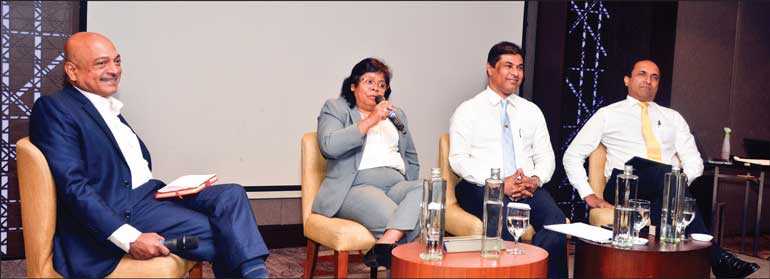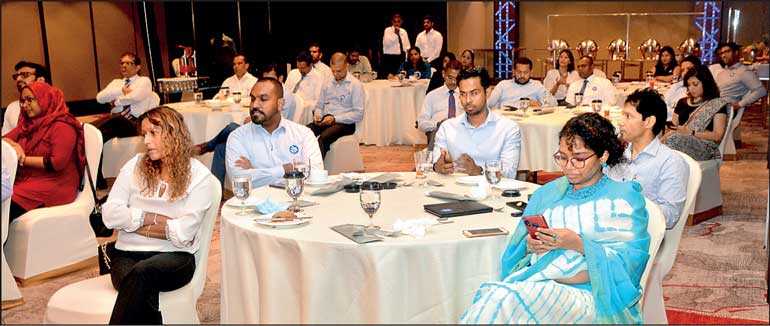Wednesday Mar 04, 2026
Wednesday Mar 04, 2026
Friday, 1 January 2021 00:00 - - {{hitsCtrl.values.hits}}

Moderator Daily FT Editor Nisthar Cassim, CIMA Vice President Melanie Janine Kanaka, Sampath Bank Senior DGM (Consumer Banking) Tharaka Ranwala and Colombo Stock Exchange CEO Rajeeva Bandaranaike at the panel
Global economies, including Sri Lanka, have been challenged by the COVID-19 epidemic, which has paralysed economies and nations, leaving many struggling for survival. Sri Lanka however, had risen above the first wave of this deadly virus, thanks to a resilient and dynamic approach from entrepreneurs, decision makers and a quick response from marketing professionals.
A team of top leaders from marketing, finance, investment and media met to discuss the challenges Sri Lanka had to overcome, and the possible approaches to address the challenges ahead, at the first post-lockdown CIM CEO Breakfast Forum, held at the Hilton Residencies.
The Forum was moderated by veteran journalist/Founding Editor of Daily Financial Times Nisthar Cassim. The panelists included CIMA Vice President/World Bank Head of Finance and Administration – Sri Lanka and Maldives Melanie Kanaka, Sampath Bank Senior Deputy General Manager – Consumer Banking Tharaka Ranwala and Colombo Stock Exchange CEO Rajeeva Bandaranaike.
“The pandemic questioned many of our existing ways of doing business and our compartmentalised approaches,” said Kanaka.
Kanaka explained that many organisations had taken for granted the way they did business. The COVID -19 pandemic challenged these norms. Overnight, companies had to shift to digital and e-commerce mechanisms from physical retail operations; working from homes against interacting in a work space; introduce health and sanitation into workplaces, retail outlets and all other access points that were not in existence before; rethink business strategies, marketing strategies and business lines from traditional forms of operations and businesses.
“Another aspect the situation emphasised was the need for collaboration versus working in silos,” Kanaka said.
While some industries and businesses struggled during the lockdown, others rose above the virus and the challenges of the lockdown. A key area of impact was marketing and sales. With many traditional marketing channels being made redundant and face-to-face access to customers restricted, marketers had to think on their feet how to tackle the ‘new norm’.
“It was about how fast you could adapt and how efficiently you could adapt,” said Ranwala.
Ranwala said this situation highlighted the need for marketers to be a part of corporate management boards, allowing directors to make more informed decisions on the market, marketing and sales in the face of crisis situations as well as re-strategizing quickly during changing market conditions.
“We were amongst one of the first financial institutions that tackled the situation efficiently. We looked at the existing conditions and challenges, the changing needs of the consumer, the ways in which they could be accessed and supported during the time, and adapted all our services to suit the requirement,” Ranwala said.
Introducing money delivery to homes, mobile ATMs, e-cash options, and offering numerous services and flexibility for online purchases and ecommerce vendors, Sampath Bank was able to partner with other financial institutions, delivery services and IT partners in implementing their emergency response.
“It is easy to address the challenges of the lockdown, but how do you optimise the investment, such as in IT, operations, partnerships post-lockdown, is the challenge that affected most conglomerates. We ensured that the investments made during the lockdown can be easily converted to support regular business and product offering as an upgrade or an added service,” Ranwala said. How does this impact the macroeconomy and the investment climate? According to Bandaranaike, the investment climate has been positive post-lockdown. With interest rates dropping and investment options limited, top stocks have plummeted, creating interest from investors. The CSE has benefitted from investors picking up stocks of conglomerates in the hope they will bounce back post-COVID-19.
“This is ironically the best time to invest in stocks and we see a lot of interest in the stock market,” said Bandaranaike.
Nadi Dharmasiri from CIM’s board of directors in Sri Lanka said: “It was great to see so many distinguished business figures at our CEO Breakfast Forum. It’s clear COVID-19 has had a massive impact of the world’s global economies but hearing how Sri Lanka’s leading business figures and marketing community have risen to the challenge is a positive sign for the future. I would urge all marketers to visit the CIM website and to take advantage of the very latest reports, insight and training, so as a country we can not only just survive the pandemic but thrive on the global business stage.”
Pix by Upul Abayasekara

